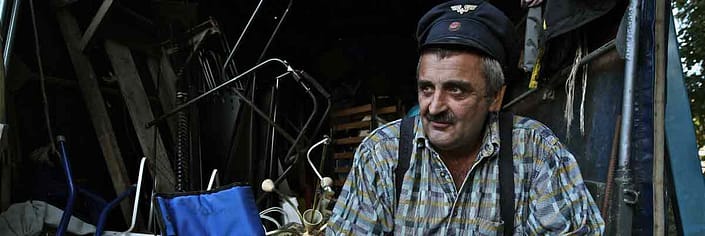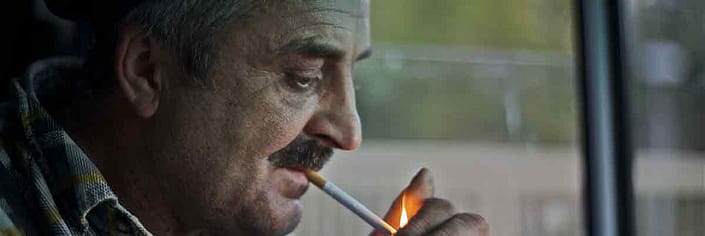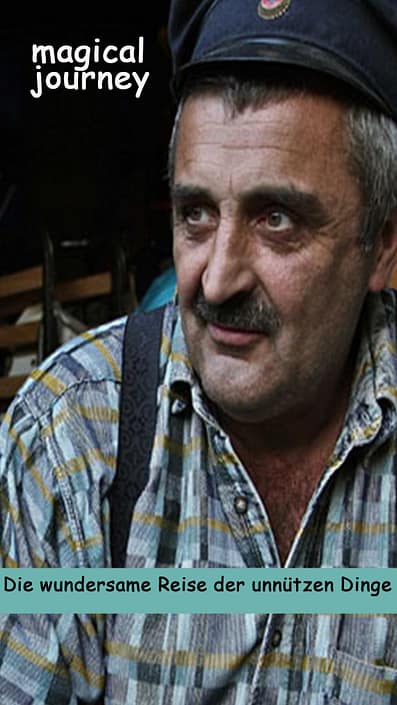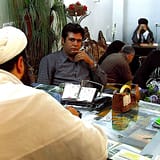Every time when the annual removal of bulky refuse is just a couple of days ahead, dozens of old Mercedes sprinters cue in the narrow, tiny streets of the villages around Mainz, Germany, block traffic, while their drivers jump out and skim through the piles of garbage to find whatever can be used or sold again way back home. The number plates reveal: some come from Hungary, Bulgaria, Romania and the Baltics, also from Germany. But most of them are coming from Poland. For some inhabitants the traffic and the people are entertainment. But onlookers with concerned faces, looking suspiciously at the Polish visitors, are still a common picture.
Prejudice against “The Strangers” – particularly against “The Polish People” – are something Piotr Liszcz and Jan Mysliwiec are used to. Piotr was one of the first in the business: Fourteen years ago, he started with an old Fiat. Ever since he has been living in Germany most of the year, his home a small trailer, with no electricity and no running water, driving from village to village to make a living. Today he is one of many, competition in the business has gotten tough in times of crisis. In Germany, it is trash – in Poland it is a good worthwhile hunting for. The documentary accompanies selected items – a children’s tricycle, a sofa, an old harmonium and others, thrown out as bulky refuse – on their journey from the house of the person, to whom this subject once mattered, via Piotr Liszcz’s Mercedes sprinter to his second hand shop in Poland to the final new owner in Poland. The documentary picks up the secret thread built up by the objects followed, tells stories from along the way and shows a facet of a modern Europe between the poor and the rich, including everything that means. “The Magical Journey of the Useless Things” thereby shows some core constants of modern live, revealing at least some of them as fallacious: how we relate to the worth of things, how relative this worth is, depending on the people who define it, what wealth is and how short-term this wealth can be. What is trash for one person can be a (small) treasure for another one. Remarkably the worth of many objects grows more and more the further this object is carried away from our centralistic Western European affluent society.
The film has been invited to the following festivals:
– 11. Festival of midle- and easteuropean film goEast in Wiesbaden.
– 26. Internationales Dokumentaryfilmfestival DOK.fest Munich
– 51ST Krakow Film Festival (Poland)
– 9. Mutimedia Happy End Festiwal Filmów Optymistycznych in Rzeszów (Poland) – Competition
– 40th International Film Festival – Lubuskie Film Summer – Łagów 2011 (Poland) – Competition
– 3rd TRANZYT Documentary Film Festival in Poznań (Poland) – Wettbewerb
– 21. Festiwal Mediów w Łodzi “Człowiek w Zagrożeniu” (Poland)
– RELIGION TODAY FILM FESTIVAL in Trento (Italy) – Competition
– 11th International Film Festival WATCH DOCS. Human Rights in Film in Warsow (Poland)
– Traveling Film Festival WATCH DOCS. Human Rights in Film (Poland)
– 14th One World International Human Rights Documentary Film Festival
Preise und Auszeichnungen:
– RELIGION TODAY FILM FESTIVAL in Trento (Italy)
Auszeichnung von Special Jury of Young People from Pergine Valsugana
– 3rd TRANZYT Documentary Film Festival in Poznań (Poland)
Auszeichnung in der Kategorie: The Best Feature Lenght Documentary (over 60 min.)







